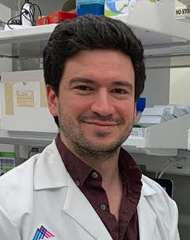A researcher of the University, award to the best doctoral thesis of the Funcas Foundation.
Alfonso Rodríguez Sánchez-Paulete focused his doctorate on the study of cells and immunotherapy strategies against cancer.

PHOTO: Courtesy
The researcher of the University of Navarra Alfonso Rodríguez Sánchez-Paulete has received the award Enrique Fuentes Quintana for the best doctoral thesis in the Health Sciences category awarded by the Funcas Foundation. His work focuses on the role played by dendritic cells in antitumor immunity.
A native of Madrid and graduate at the University Francisco de Vitoria, Alfonso Rodríguez Sánchez-Paulete completed the Master's Degree and doctorate in research Biomedical at School of Sciences of the University of Navarra. In 2018 he received the award extraordinary doctorate.
"The awarding of the award Enrique Fuentes Quintana was for me a cause for surprise and joy. Practically any work done today in the field of health sciences requires a team, so this award is also for my director of thesis , Ignacio Melero, and for the components of the group of Immunology and Gene Therapy of Cima. I have been fortunate to work in a human and scientific environment that has allowed me to learn, grow and has prepared me for my current position," he said.
She is currently a postdoctoral fellow at researcher at Mount Sinai Hospital in New York, in the laboratories of Dr. Brian Brown and Dr. Miriam Merad. "My research continues to focus on development new tools in the field of cancer immunotherapy, although in this case not so exclusively focused on dendritic cells," she explains.
During their stay in Pamplona, in a work published in October 2015 they demonstrated that the absence of these cells prevents tumor-bearing mice from responding to immunotherapy with agents used in the clinic such as anti-PD1 or anti-CD137. "Similarly, potentiation of the activity of these cells resulted in better activity of these agents, even against tumors that normally do not respond to this treatment subject ," he adds.
In 2018, the University of Navarra's researcher published a second work proposing a genetically modified viral vector as an anti-tumor immunotherapy agent. "The viral vector is based on Semliki Forest virus (SFV), and was modified to instruct infected tumor cells to produce factors that attract and potentiate the cDC1 cells that are the backbone of this thesis . Injection of this virus into tumors in mice slowed the growth of these tumors and served to enhance the antitumor activity of other agents."
Since 2007, Funcas awards the excellence of work of research economic and social in its academic format par excellence: the thesis doctoral. The awards are structured in four categories: Social Sciences; Health Sciences; Engineering, Mathematics, Architecture and Physics; and Humanities.
